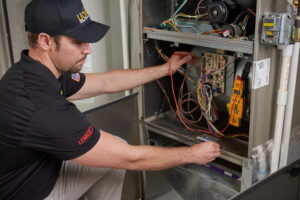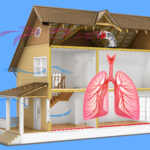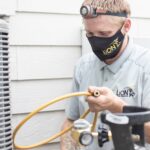What separates Lion Home Service from other HVAC companies, and positions us as experts in our field, is our comprehensive Maintenance programs. Unlike other companies that only perform a simple check for loose bolts or dirty filters, we check the entire system from top to bottom—to help it work efficiently all year long.
To help you understand what our maintenance assessment entails, we’ve compiled a list of the major points for both the heating and cooling season. In this article, we’ll explain what each major point is, and how it benefits your system.
HVAC Maintenance for the Heating Season
Every year we find ourselves turning up the thermostat to keep our homes warm—especially when Northern Colorado temperatures really starts to drop! During a heating maintenance assessment, our service expert will inspect your home’s heating system and ensure that it’s ready to keep you comfortable in the winter months.
Heating
- Check all the burners for proper operation
- Check thermocouple for proper operation
- Check the flue pipe
- Check the inducer and blower motors
- Check and tighten all electrical connections
- Check the safety switch and controls
- Check the pilot assembly
- Check temperature and pressures
- Check thermostat for proper operation
- Check drain lines and traps for proper function
- Testing and labeling of emergency shut-offs
- Check gas valve
- Check zone valves
- Check expansion tank
- Check aquastat, relay and water regulator
- Check air flow across indoor coil and blower wheels
- Check duct work for leaks
- Start and test operation and cycle of unit
- Check air flow
- Check humidifier/dehumidifier
Here are the top 4 services you can expect during a heating season maintenance assessment and why we do them.
1. Check gas valves and connectors
The gas valve of your furnace supplies the gas it needs to allow combustion. Since it’s an important part to a fully functioning furnace, it should be thoroughly checked out to ensure that everything is in good working order. The service expert will inspect your furnace’s gas valve to make sure it’s allowing combustion, as well as inspecting all connectors to make sure they’re doing their job of powering the furnace.
2. Check burners
Burner flames should be a bright blue color. Yellow flames indicate dirty burners or that the gas is not completely lit, which can impact your unit’s heating performance. Problems with the burner can also indicate a potential gas leak, which could be dangerous. Since burner fixes are best left to the professionals, the service expert will inspect them and alert you to any problems during your maintenance assessment.
3. Check duct connection
Ensuring that your ducts are free from damage, debris, and leaks will improve the air quality in your home and keep your heating system operating at its best.
A duct system helps deliver and remove air from your home through a controlled path. This path begins at an outlet connected to your HVAC system, and runs throughout your home. As part of your maintenance call, the service expert will inspect your duct connection and ensure that it’s in good shape and free of any leaks. If there are any leaks, the service expert will let you know how to improve efficiency.
4. Check furnace belt
In most cases, the air fan that provides heat for your home is powered by an external motor. If the belt between the motor and the fan breaks or is worn out, problems can arise—including less efficient heating and higher energy bills.
A worn furnace belt can create a squeaking noise, while a belt that is too loose will keep the fan from turning as it should. The service expert will inspect the belt for signs of wear and tear, and let you know how its operating.
HVAC maintenance for the Cooling Season
During the cooling season, your AC system should be serviced to ensure it’s ready to withstand the blazing summer heat. We’ll inspect the unit to make sure you won’t have any unwelcome surprises when the temperatures start to rise. As part of your maintenance assessment, a service expert will examine your air conditioning system and alert you to issues on components such as refrigerant levels, condenser coils, and more—which are typically overlooked by other HVAC companies.
Even if you had a maintenance assessment the previous winter, it’s still important to schedule maintenance for the summer. This is because the two assessments differ and address different elements of the HVAC system.
Cooling
- Check condenser coil
- Check evaporator coil
- Check blower motor
- Check refrigerant charge
- Check and tighten all electrical connections
- Check temperature and pressures
- Check thermostat for proper operation
- Check and labeling of emergency shut-offs
- Check controls and safety devices
- Check capacitors
- Check condensate drain
- Check relays and contactors for proper operation
- Check duct work for leaks
- Check proper amperage and voltage of A/C system
- Start and test operation and cycle of unit
- Check air flow
- Check humidifier/dehumidifier
Here are the top 4 services you can expect during a maintenance assessment on the Cooling system and why we do them.
1. Check refrigerant levels
One of the first things our service expert will do on a maintenance assessment is check your AC unit’s refrigerant levels. Refrigerant is a compound that absorbs heat and generates cold air when combined with components such as compressors and evaporators. If your refrigerant levels are low, a leak is mostly likely to blame. Without any refrigerant, your AC system won’t work at all, and you’ll quickly notice a hot and uncomfortable home. It’s our service expert’s responsibility to check for any leaks and alert you to any needed repairs, to ensure your unit will be set to run all summer long.
2. Check condenser coils
Condenser coils absorb the heat from inside the house and release it outside. If the condenser coil is dirty, this process is interrupted, and the system doesn’t function as it should.
A dirty condenser coil can cause problems including:
- Higher energy bills
- Uncomfortable room temperature
- A system breakdown
During a maintenance assessment, the service expert will clear any debris, that may be surrounding the unit. They’ll also alert you if any additional cleaning is required.
3. Check thermostat calibration
If your thermostat is out of sync with your unit, your home may never actually reach the temperature you set it to. Your air conditioning may also show signs of short cycling, meaning it turns on and off frequently. This can wear down your system and result in higher energy bills. If the service expert notices your thermostat is reading wrong, they’ll re-calibrate it to make sure that it reads accurately.
4. Check air flow and filter size
Even the best air conditioning system won’t be able to cool your home effectively if your filters are clogged, dirty, or the wrong size. Additionally, filters that are too big or too small can let unfiltered air into your home, increasing your exposure to allergens and pollutants. The service expert will check the filters in order to ensure that they’re the right size, and that air is flowing correctly. If there’s a problem with the filters, they will either replace them during the maintenance assessment or schedule a follow-up.
It’s important to perform regular annual maintenance on your units to make sure both your air conditioning and heating systems operate at peak performance well into the future. Just as you take your car in for regular maintenance, regular maintenance is required of your HVAC units to ensure they operate effectively and efficiently.
Your manufacturer’s warranty will not cover maintenance visits. However, most manufacturers require your unit to be maintained annually to protect your warranty and keep your part warranty up to date.
When to schedule maintenance
We recommend scheduling your maintenance calls in the Spring and in the Fall, before the Summer or Winter temperatures start. That way, any problems with your unit can be addressed before you need to rely heavily on heating or cooling. We will even call to remind you!
Get started today
Whether you’re looking to schedule a maintenance assessment, or have no heat, no cool, or any other HVAC, Furnace, or Air Conditioner repair need, contacting Lion Home Service is the best place to start. With more than 20+ years of experience, we’ve remained dedicated to providing quality service you can trust. No matter what time of year, Lion Home Service is here to help with all your heating and cooling needs. We serve For Collins, Loveland, Greeley, Longmont, Boulder, Windsor and the surrounding areas. Contact us today to schedule an appointment with an expert you can trust. 970-399-9940










